The Intel Core i9-9900KS Review: The 5 GHz Consumer Special
by Dr. Ian Cutress on October 31, 2019 10:45 AM ESTCPU Performance: Rendering Tests
Rendering is often a key target for processor workloads, lending itself to a professional environment. It comes in different formats as well, from 3D rendering through rasterization, such as games, or by ray tracing, and invokes the ability of the software to manage meshes, textures, collisions, aliasing, physics (in animations), and discarding unnecessary work. Most renderers offer CPU code paths, while a few use GPUs and select environments use FPGAs or dedicated ASICs. For big studios however, CPUs are still the hardware of choice.
All of our benchmark results can also be found in our benchmark engine, Bench.
Corona 1.3: Performance Render
An advanced performance based renderer for software such as 3ds Max and Cinema 4D, the Corona benchmark renders a generated scene as a standard under its 1.3 software version. Normally the GUI implementation of the benchmark shows the scene being built, and allows the user to upload the result as a ‘time to complete’.
We got in contact with the developer who gave us a command line version of the benchmark that does a direct output of results. Rather than reporting time, we report the average number of rays per second across six runs, as the performance scaling of a result per unit time is typically visually easier to understand.
The Corona benchmark website can be found at https://corona-renderer.com/benchmark
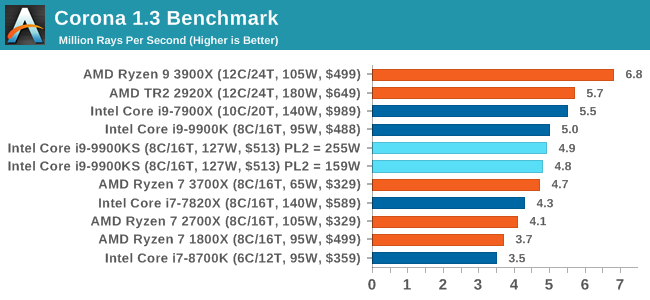
Interestingly both 9900KS settings performed slightly worse than the 9900K here, which you wouldn't expect given the all-core turbo being higher. It would appear that there is something else the bottleneck in this test.
Blender 2.79b: 3D Creation Suite
A high profile rendering tool, Blender is open-source allowing for massive amounts of configurability, and is used by a number of high-profile animation studios worldwide. The organization recently released a Blender benchmark package, a couple of weeks after we had narrowed our Blender test for our new suite, however their test can take over an hour. For our results, we run one of the sub-tests in that suite through the command line - a standard ‘bmw27’ scene in CPU only mode, and measure the time to complete the render.
Blender can be downloaded at https://www.blender.org/download/
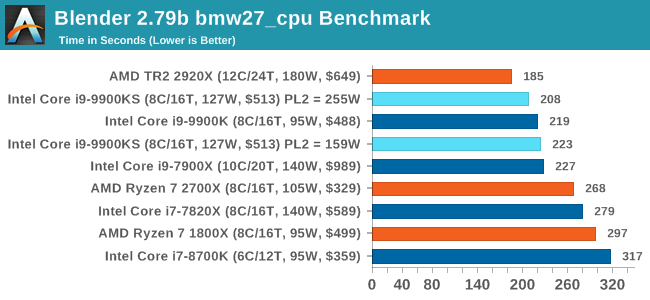
All the 9900 parts and settings perform roughly the same with one another, however the PL2 255W setting on the 9900KS does allow it to get a small ~5% advantage over the standard 9900K.
LuxMark v3.1: LuxRender via Different Code Paths
As stated at the top, there are many different ways to process rendering data: CPU, GPU, Accelerator, and others. On top of that, there are many frameworks and APIs in which to program, depending on how the software will be used. LuxMark, a benchmark developed using the LuxRender engine, offers several different scenes and APIs.
In our test, we run the simple ‘Ball’ scene on both the C++ and OpenCL code paths, but in CPU mode. This scene starts with a rough render and slowly improves the quality over two minutes, giving a final result in what is essentially an average ‘kilorays per second’.
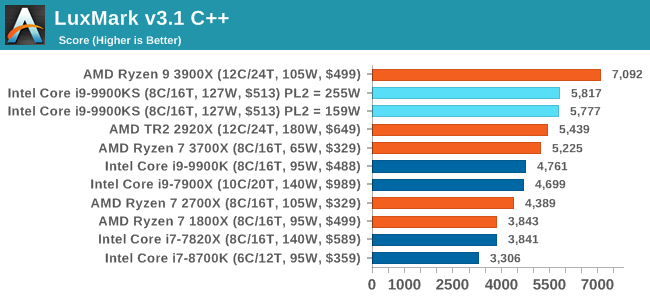
Both 9900KS settings perform equally well here, and a sizeable jump over the standard 9900K.
POV-Ray 3.7.1: Ray Tracing
The Persistence of Vision ray tracing engine is another well-known benchmarking tool, which was in a state of relative hibernation until AMD released its Zen processors, to which suddenly both Intel and AMD were submitting code to the main branch of the open source project. For our test, we use the built-in benchmark for all-cores, called from the command line.
POV-Ray can be downloaded from http://www.povray.org/
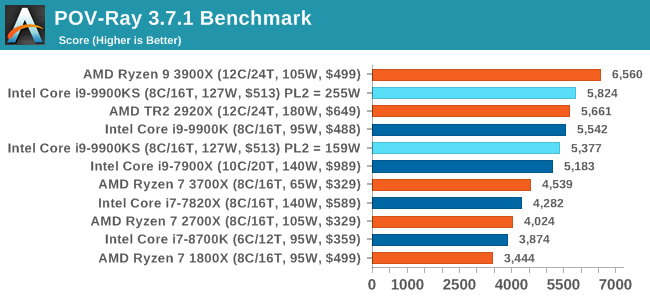
One of the biggest differences between the two power settings is in POV-Ray, with a marked frequency difference. In fact, the 159W setting on the 9900KS puts it below our standard settings for the 9900K, which likely had an big default turbo budget on the board it was on at the time.


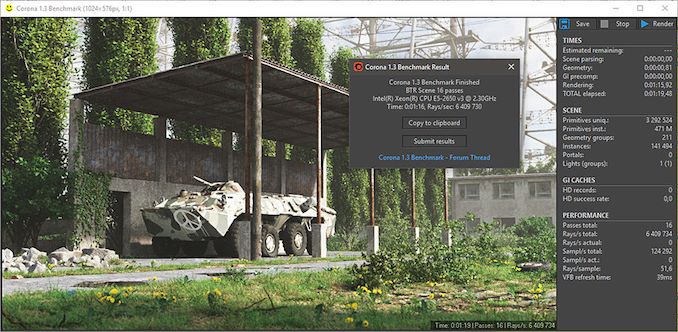








235 Comments
View All Comments
mikato - Thursday, October 31, 2019 - link
Is it just me or does it seem like the 3700X wins all those tests?Sivar - Thursday, October 31, 2019 - link
I am pretty sure it's just you. The 3700x won exactly one test case: Strange Brigade on low detail.AshlayW - Friday, November 1, 2019 - link
In terms of value, yeah it pretty much does. It beats Intel's entire lineup. -5-10% performance, (even in gaming), -40% price, and +30% efficiency, includes a cooler too. The thing is, the Ryzen 5 3600 does it, and then some.Sivar - Friday, November 1, 2019 - link
The Ryzen 5 3600 is probably overall the "Smart person's CPU" while those that don't know how money works, like myself, quibble over a few % difference across $500 CPUs.Death666Angel - Saturday, November 2, 2019 - link
Or if you do any sort of work or intensive stuff with your PC besides game. :)The_Assimilator - Thursday, October 31, 2019 - link
Imagine if Intel had spent as much time and effort on fixing their 10nm process, as they're spending on binning and advertising 5GHz 14nm++++ chips./sarc
Jorgp2 - Thursday, October 31, 2019 - link
Any idea when cascade lake drops?nathanddrews - Thursday, October 31, 2019 - link
Seems like a beast CPU, not sure why all the haters.TEAMSWITCHER - Thursday, October 31, 2019 - link
I think there are a set of AMD propaganda artists that like to hit pieces like this. You see the same comments in lots of different articles.Alistair - Thursday, October 31, 2019 - link
It isn't AMD propaganda, one of the problems is the way people perceive written communication with strangers, you can't share ideas with people you don't know, especially contrary ones.If I check my Asus motherboard and 9700k, it uses 170W at default settings. Then it drops to 3.9ghz and uses exactly 95W. So it is a 170W CPU with all those benchmarks you see out there, that is highly misleading. I'd expect this new one to use more. People have been angry at Intel for some time for not listing their turbo power as TDP.
If I check my 3700x, it uses 65 watts. So my 9700k uses 2.6x times more power, and yes, it is faster (not in MT, but in ST) than my 9700k. That's all fair to point out, and not propaganda.
I think the 8700k was a genuinely good processor, with a large cache (not artificially limited like the 9700k) and 50 percent more speed for the same money. Now we have the 9900k only 33 percent faster at best, and WAY more expensive and much too power hungry. I haven't built any 9900k computers, and only have one 9700k computer (I bought the CPU used for a low price).